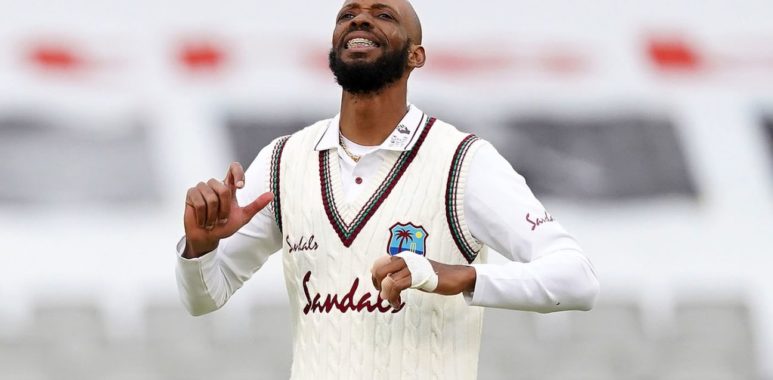
Jermaine Blackwood, Roston Chase, Shannon Gabriel top West Indies report card
West Indies made the bold decision to travel to a nation with one of the highest Covid-19 death rates in the world, for which the ECB says it will be eternally grateful. By the end of the tour, the rigors of spending so long away from home in complete isolation was beginning to tell and a series that began so brightly for the visitors became beset by physical and mental fatigue. Here are the marks out of ten:
7
Jermaine Blackwood (211 runs at 35.16)
The most improved player for West Indies. Blackwood was the only one who came closest to raising his bat to mark a Test century, missing the landmark by five runs having set up the victory in Southampton. Naturally aggressive, Blackwood learned on the job to not get excited having engaged erroneously with Ben Stokes and losing his head on the penultimate afternoon in the second Test. Finished the tour as Windies’ top run-scorer.
Roston Chase (10 wickets at 34.00, 157 runs at 28.16)
Player of the Series mainly for his bowling, but in the Southampton victory, Chase played a significant hand with the bat, providing semblance to the middle order when England were threatening to regain control. Got a five-for in the second Test. His aim was to score a Test century in England, but he was exposed playing back to deliveries coming in. Finished the series caught napping and was run-out.
Shannon Gabriel (11 wickets at 32.27, 4 runs at 2.00)
Took the first wicket of the series, ended up being one of most persevering bowlers and the third-highest wicket-taker behind Stuart Broad and Chris Woakes. Started the series stiff, having not played since last September. Remained stiff due the endless workload through the series. Bowled with pain but never showed it as he hit the bat hard and created opportunities.
6
Kemar Roach (8 wickets at 36.50, 15 runs at 5.00)
Bowled the most overs in the series (116.4). Had the most maidens (31). Was the second most economical bowler behind James Anderson. Yet Roach was not as lucky as others finishing with just eight wickets. He went wicketless in the first Test, but he returned proud to the bowling mark, never allowing the batsman the upper hand. Set an example with endless toil.
5
Jason Holder (10 wickets at 30.10; 114 runs at 22.80)
It was the West Indies captain who broke England’s back in the first innings with five-for. He swapped the best allrounder position on the ICC rankings with Stokes through the series, Holder failed to play the decisive hand that Stokes managed with the bat. It would hurt the Barbadian’s pride to return home without a Test century. His leadership, too, was under scrutiny especially after he twice inserted England to bat in overcast conditions at Old Trafford.
4
Kraigg Brathwaite (176 runs at 29.33)
Finished the series as a pub quiz question – the batsman who was the 500th Test wicket for Broad and Anderson. Before the series Brathwaite had worked on his technique with former Windies batting great Desmond Haynes. The counselling worked, it seemed, as Brathwaite scored twin half-centuries, both in the first innings of the first two Tests, playing the new ball late. However, the Windes vice-captain failed to cash in on his starts and continued with his string of second-innings failures while struggling with a fraught technique.
Shamarh Brooks (195 runs at 32.50)
The most watchable Windies batsman in this series. With an upright, side-on stance Brooks showed composure, timing, placement and good wrist work while making quick starts. However, the promise never lasted long as Brooks struggled to bat for longer or, as in the final Test, played a ball he could have left.
3
Shane Dowrich (126 runs at 21.00; 7 catches)
Will be remembered for getting hit on the mouth after failing to collect a fast ball from Gabriel in the final Test. It only put under scrutiny his glovework to both types of bowling. Also got exposed with the bat by jumping against the short delivery, which became a weakness as the series progressed.
2
John Campbell (84 runs at 16.80)
The only left-hand batsman for the visitors, Campbell had his toe bruised by Jofra Arher in the second innings of the first Test. He would return to hit the winning runs, but otherwise Campbell remained a walking wicket despite showing a much more positive attitude in the final innings of the third Test.
Alzarri Joseph (59 runs at 19.66; 3 wickets at 60.66)
West Indies head coach predicted Joseph would the difference this series. Joseph got three wickets playing the first two Tests. He has the pace, but he struggled for control and rhythm. According former Windies fast bowler Andy Roberts, Joseph needs to use his body more than his shoulder.
Rahkeem Cornwall (12 runs at 6.00)
Replaced Joseph in the final Test as the fast bowler had a sore elbow. Recognised for his bounce, Cornwall started well, but fell silent as England attacked him. Cornwall aims to become a specialist batsman, but his head keeps falling away and he loses balance quickly.
1
Shai Hope (105 runs at 17.50)
In a chat with Sachin Tendulkar before the series, Brian Lara folded his hands to pray Hope’s talent would flourish during the England series. Hope had not scored a single century since his record twin tons at Leeds in 2017. Hope and everyone in the Windies camp assured the issue was not technical and more mental. Hope finished the series with a highest individual score of 31, amassing just 105 runs in six innings. On the 2017 England tour Hope’s average was 75. This time it was 17. Lara shouldn’t have wasted his time.

